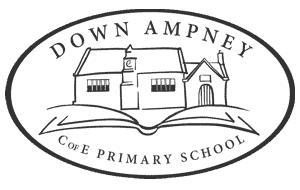
Teachers carefully build pupils’ knowledge and understanding of how to use grammar and punctuation to good effect in their writing.
Ofsted
Writing
At Down Ampney C of E Primary School, our vision for Writing is that children’s outcomes are stimulated through a range of high-quality texts and they enjoy exposure to a range of fiction, non-fiction, and poetry writing opportunities.
Intent
The school’s writing curriculum is meticulously planned, following discrete grammar, punctuation, or spelling focuses linked to texts, enabling children to write using a variety of styles and genres. Writing development begins in Reception, where children engage in activities such as sharing stories, describing and sequencing events, exploring mark-making, and participating in back-and-forth talk. Phonics lessons play a pivotal role, as children are discreetly taught letter formation, word building, and phoneme-grapheme correspondences to assist them in constructing sentences independently.
Throughout units of work, ‘incidental writing opportunities’ are embedded to allow children to apply taught grammar, language, and structural features, culminating in a final independent writing piece. Carefully selected texts are language-rich and encompass a diverse range of stories from around the world, enhancing both cultural and imaginative outcomes.
Objectives are broken down into small steps to ensure mastery of each writing focus, building upon prior knowledge and skills. Support tools such as word mats, sound cards, and sentence stems are provided to scaffold children’s independent writing and promote their autonomy.
Lessons follow an ‘I do, we do, you do’ approach, facilitating the modelling of every objective before children undertake independent tasks.
We enrich learning experiences by enabling participation in author workshops, literature festivals, and inviting specialists to engage with the children. More able writers are afforded the opportunity to showcase their writing and participate in specialised writing sessions.
Focused intervention groups ensure that children can keep pace with the curriculum and confidently apply taught strategies to their writing.
Teaching sequences are broken down into small steps, allowing for continuous reinforcement of previously taught skills, and adjustment of objectives as needed to support children’s progression.
Key texts at Down Ampney C of E Primary School emphasise a sense of belonging and place while closely aligning with British values and protected characteristics.
Children are empowered to support others and themselves, utilising resources such as word banks, learning walls, and phonic strategies.
The school’s core values of Respect, Courage, and Trust are instilled through a myriad of diverse and moral stories, fostering enriching discussions on key themes and encouraging children to explore various genres and write for diverse audiences.
Implementation
The school’s writing curriculum is carefully crafted to integrate best practices and enhance the teaching and learning experience for both staff and pupils. Teaching staff are provided with valuable opportunities to collaborate with writing specialists throughout the year, which enriches their practice. These insights are then imparted to support staff through modelled lessons and coaching sessions.
Collaboration with the English Hub and School Improvement Partners empowers teachers to meticulously plan teaching sequences that progress consistently across the school. Interactions within the Local Authority English subject leader network meetings and engagement with neighbouring schools, enable teachers to exchange innovative ideas, fortify planning strategies, and engage in collaborative moderation of pupil work.
The curriculum incorporates a diverse selection of core texts for each unit, encompassing a mix of narrative stories and non-fiction books that address key thematic elements. Aligned with the National Curriculum, punctuation, grammar features, and spelling rules are intricately woven into the planning, bolstered by dedicated phonics lessons. Writing objectives encompass a variety of genres, encouraging pupils to write for different purposes such as informing, entertaining, discussing, or persuading.
Interactions through talk partners foster an environment for sharing thoughts and ideas during writing lessons. Teachers adopt flexible groupings to gauge pupils’ comprehension levels and offer tailored support where necessary. Building on prior learning, pupils are encouraged to use learning walls and writing scaffolds to foster independence in applying writing skills.
The school actively engages with local partners and authors, organising workshops and performances to enrich writing experiences. Authors frequently visit the school to share insights into their writing journeys and conduct exciting workshops with children. By accessing class sets of books and maintaining a well-stocked library, all children have equitable access to the focus text, enhancing their writing.
Regular end-of-unit writing moderation helps identify pupils’ next steps and misconceptions, aiding teachers in providing targeted support and revisiting objectives in subsequent units of work. External moderation verifies the accuracy of assessments, ensuring robust evaluation of pupil progress and attainment.
Impact
At Down Ampney C of E Primary School, the writing curriculum is designed to provide a structured and stimulating platform for our pupils to develop essential writing skills in accordance with the 2014 National Curriculum. Recent feedback from our pupils demonstrates that they are able to retain taught knowledge and apply it effectively in various contexts. Particularly, pupils showcased the ability to identify conjunctions when reading stories, showcasing their understanding of grammatical structures.
A notable feature of our writing curriculum is the encouragement of independent reading and writing among our pupils. Children have the opportunity to self-select sequels of class texts they have enjoyed, fostering a love for literature while promoting peer interaction through sharing their discoveries with friends.
By the end of Key Stage 2, our pupils are equipped with the necessary writing skills to transition effectively to the demands of secondary education. The majority of our pupils meet or exceed the expected standards, showcasing their attainment and progress in writing proficiency.
The school ensures that pupils with Special Educational Needs (SEN) progress well in line with their peers. Outcomes for SEN pupils in writing are consistently good, reflecting our inclusive approach to education and commitment to supporting every child’s learning journey.

